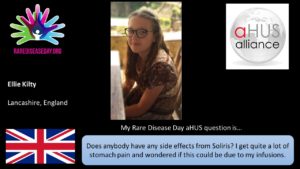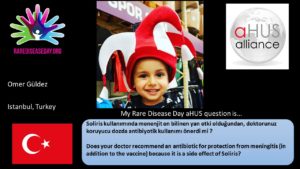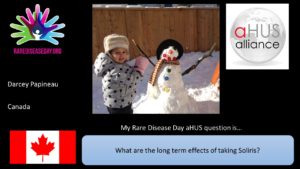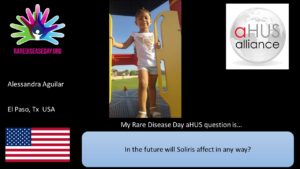Other questions featured in the Rare Disease Day video about the aHUS treatment eculizumab, relate to side effects from infusions of the drug.

Ellie of Lancashire England asks “Does anybody have side effects from eculizumab? I get quite a lot of stomach pain and wondered if this could due to my infusions”
Lisa of Staffordshire Moorlands UK asks “How long until we know if there are long term side effects to using Soliris?”
Darcy of Canada asks “What are the long term effects of eculizumab infusions?”
Alessandra of El Passo Texas USA asks “In the future will eculizumab affect in any way?”
Read any leaflet that comes with any drug or medicine and a list of side effects from taking them will certainly appear.
So it is with aHUS treatments ,whether it is from having plasma exchange or dialysis, or by having access to eculizumab.
There is a some anecdotal evidence in the social media about aHUS patients experiences during, and immediately following eculizumab infusions.
There is a comprehensive list of what are termed ” adverse events” associated with treatment by eculizumab for aHUS in the FDA document “HIGHLIGHTS OF PRESCRIBING INFORMATION” based on what adverse events were reported during the long term trials* for both PNH and aHUS by 2015.
There are three tables ( 5, 6 and 7 ) which contain the results for 100 aHUS patients in four studies covering adults and children.
These are long lists ,and they show the number of events reported and how prevalent they were. They can be seen in Section 6 starting from page 7 of the document .click here
The most frequently reported adverse reactions in aHUS single arm prospective trials (≥20%) are: headache, diarrhea, hypertension, upper respiratory infection, abdominal pain, vomiting, nasopharyngitis, anemia, cough, peripheral edema, nausea, urinary tract infections, pyrexia
That answers whether adverse events happen when being treated with eculizumab, including mention of stomach pain Ellie whether by 2015 that is sufficiently long term enough to answer Darcy,Lisa and Alessandra ‘s question to know whether all side effects have been reported and the significance of them is something for the aHUS research Agenda. As is the question why do aHUS patients report more adverse events than PNH patients using the same drug?

But Omer of Instanbul Turkey ‘s asks “Does your doctor recommend an antibiotic for protection from meningitis (in addition to the vaccine) because it is a side effect of eculizumab?”. This question about the significant side effect of the blocking C5 , which raises the risk of meningococcal infections already has answers in Section 5 of the FDA document .
Serious Meningococcal Infections
The use of Soliris increases a patient’s susceptibility to serious meningococcal infections (septicemia and/or meningitis). Life-threatening and fatal meningococcal infections have occurred in patients treated with Soliris. Administer a polyvalent meningococcal vaccine according to the most current Advisory Committee on Immunization Practices (ACIP) recommendations for patients with 5 Reference ID: 3855296 complement deficiencies. Revaccinate patients in accordance with ACIP recommendations, considering the duration of Soliris therapy. Immunize patients without a history of meningococcal vaccination at least 2 weeks prior to receiving the first dose of Soliris. If urgent Soliris therapy is indicated in an unvaccinated patient, administer the meningococcal vaccine as soon as possible. In prospective clinical studies, 75/100 patients with aHUS were treated with Soliris less than 2 weeks after meningococcal vaccination and 64 of these 75 patients received antibiotics for prophylaxis of meningococcal infection until at least 2 weeks after meningococcal vaccination. The benefits and risks of antibiotic prophylaxis for prevention of meningococcal infections in patients receiving Soliris have not been established. Vaccination reduces, but does not eliminate, the risk of meningococcal infections. In clinical studies, 2 out of 196 PNH patients developed serious meningococcal infections while receiving treatment with Soliris; both had been vaccinated [see Adverse Reactions (6.1)]. In clinical studies among non-PNH patients, meningococcal meningitis occurred in one unvaccinated patient. In addition, 3 out of 130 previously vaccinated patients with aHUS developed meningococcal infections while receiving treatment with Soliris [see Adverse Reactions (6.1)]. Closely monitor patients for early signs and symptoms of meningococcal infection and evaluate patients immediately if an infection is suspected. Meningococcal infection may become rapidly life-threatening or fatal if not recognized and treated early. Discontinue Soliris in patients who are undergoing treatment for serious meningococcal infections.
What access to vaccinations and prophilactic antibiotics there is, is determined by the health policies in each country;but best practice suggests that vaccination with both meningococcal strains ACWY vaccine and Bexsero(B strain) and prophilactic antibiotics has clinical support.
aHUS patients should talk to their clinicians about the issue if they have concern; and if these treatments are prescribed it is important for patients to be compliant, as lapses can risk breakthrough meningococcal infections
* the long term aHUS studies are due to conclude in September 2017 and there will be a full report of their findings up to that point. The aHUS Registry will then include the patients from the long term studies and they will be monitored up to 2o25 as part of that general global study of aHUS.




